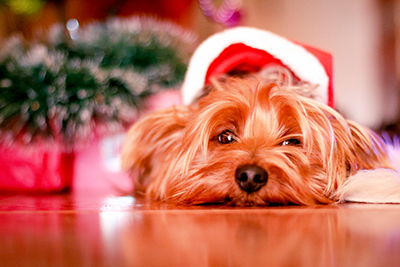
Christmas time can present a number of hazards to pets, with figures from the British Veterinary Association (BVA) revealing 80% of vets saw at least one case of toxic ingestion in pets during the last festive period.
Across the UK, chocolate poisoning in dogs was the most common cause of toxic ingestion at Christmas; often occurring when chocolate gifts had been left wrapped under Christmas trees.
Almost a quarter of vets treated cats with antifreeze poisoning with a further one in five vets treated of ingestion of poisonous plants such as lilies which can be fatal to cats.
British Veterinary Association President, Gudrun Ravetz, has urged any pet owner who suspects their pet may have eaten something they shouldn’t not to delay in contacting their local vet.
To keep Christmas merry for the whole household, follow their five simple tips from the BVA:
- Protect your pet from poisons – a number of festive treats and traditions, such as chocolate, raisins, xylitol (found in sugar free treats), nuts, grapes, liquorice, poinsettia, holly and mistletoe are toxic to cats and dogs.
- Keep decorations out of reach – ribbons, wrapping paper, baubles, tinsel and tree lights can all prove irresistible to cats and dogs but can be very dangerous if broken, chewed or swallowed. Batteries for Christmas gifts also need to be kept safe as, if ingested, they may cause severe chemical burns to the mouth, throat and stomach.
- Forget festive food for pets – we all enjoy a richer diet over Christmas, but fatty foods and Christmas dinners shouldn’t be shared. They can trigger indigestion, sickness and diarrhoea or even conditions from gastroenteritis to pancreatitis, so try to stick to your pet’s regular diet and routine. Bones, including turkey bones, should not be given to pets as they can splinter and puncture the digestive tract.
- Give toys not treats – we all want our pets to share the fun and many of us include a gift for our pet on the shopping list. But too many treats can lead to fat, unhappy animals so consider opting for a new toy, or a long walk if you want to indulge your pet this Christmas.
- Know where to go – even with all the care in the world, animal accidents and emergencies can still happen. Make sure you’re prepared by checking your vet’s emergency cover provision and holiday opening hours or, if you are away from home, use the Royal College of Veterinary Surgeons’ Find a Vet facility at http://www.findavet.org.uk/
For more information on pets and poisons, download the free Animal Welfare Foundation leaflet.

